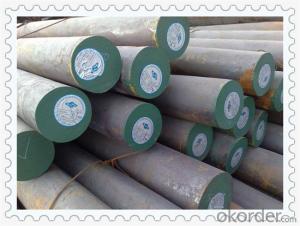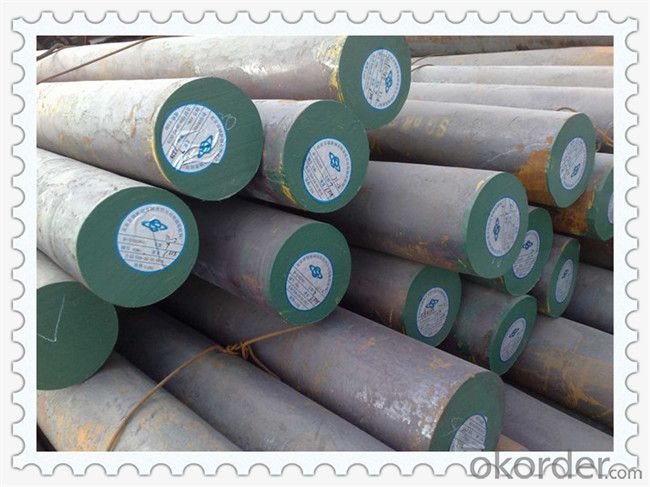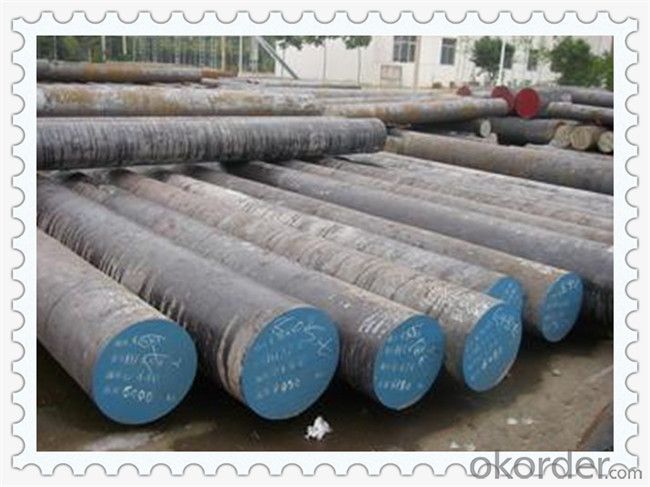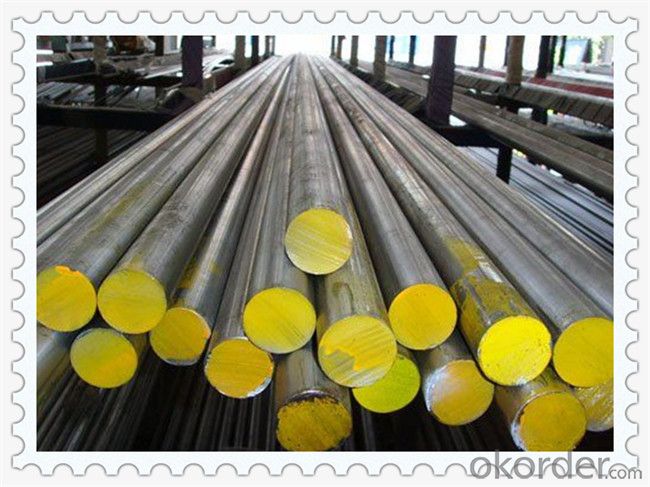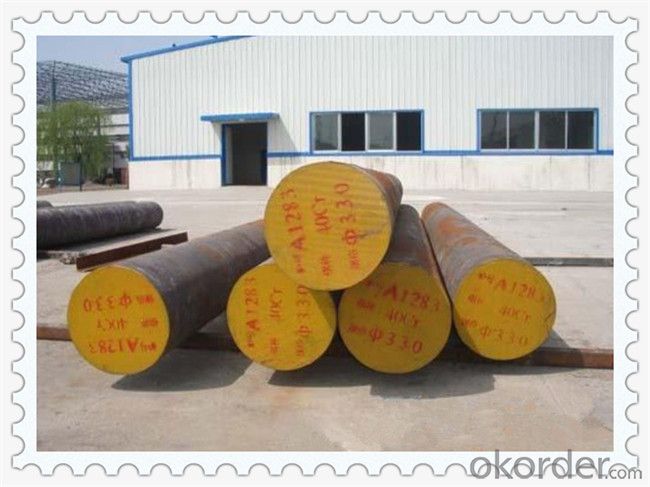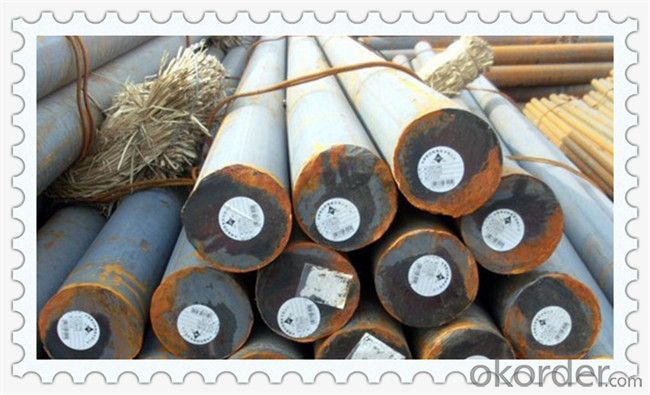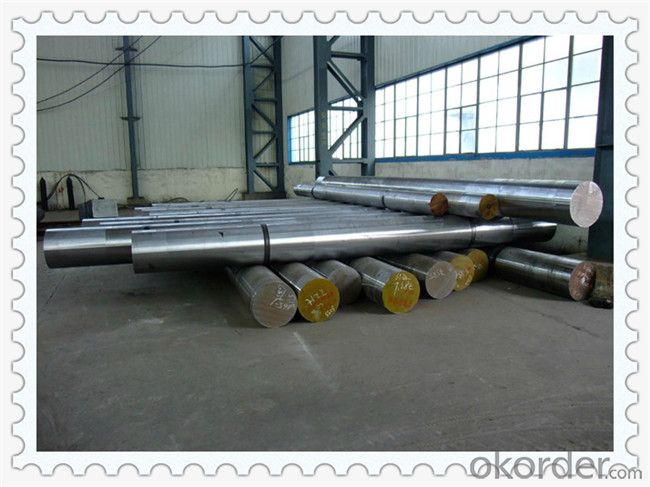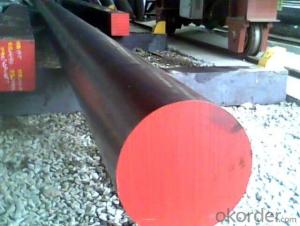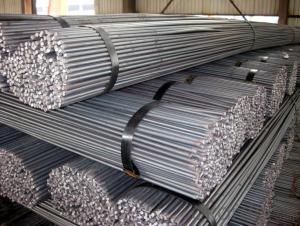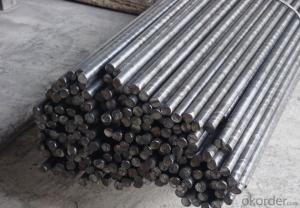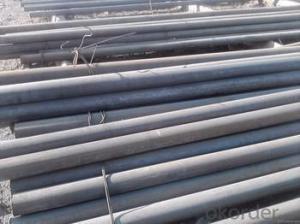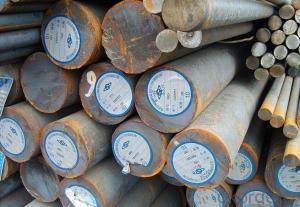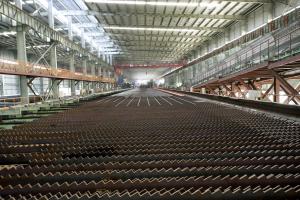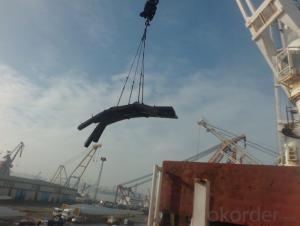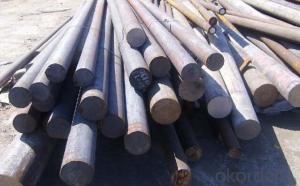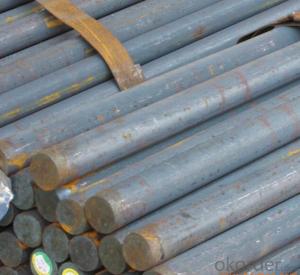Hot Rolled A36 Carbon Steel Round Bars
- Loading Port:
- China main port
- Payment Terms:
- TT OR LC
- Min Order Qty:
- 30 m.t.
- Supply Capability:
- 10000 m.t./month
OKorder Service Pledge
OKorder Financial Service
You Might Also Like
Hot Rolled A36 Carbon Steel Round Bars
Product Details
Material: Q195; Q235; A36; SS400; ST37; SAE1006/1008; S275JR; 20#; 45#;
Q345,S355JR; 16Mn; ST52;42CrMo; 40CrNiMo etc.
Dia.: 6mm--300mm(Hot rolled round bar)
6mm--110mm(Cold drawn round bar)
120mm--600mm(Forged round bar)
Length: fixed length, random length, (3m--12m)
Application of This Product:
Household Appliance | Refrigerator shutter &side panels, Rice Cooker, Washer, Microwave Ovens, Freezers, Air conditions, Water Heaters, Sterilization Cabinets, Range Hoods, Computer Panels , DVD/DVB panels, TV back panel etc. |
Construction Material | Fireproof Door &Kitchen Cabinet ,Ceiling, Sanitary Unit, Elevator etc. |
Transportation | Car, Ship, Trains, Aircraft Equipment. etc. |
Education and Health Field | Electronic Writing Boards, Projection Screens, Clean Operating Rooms, etc. |
Products Show
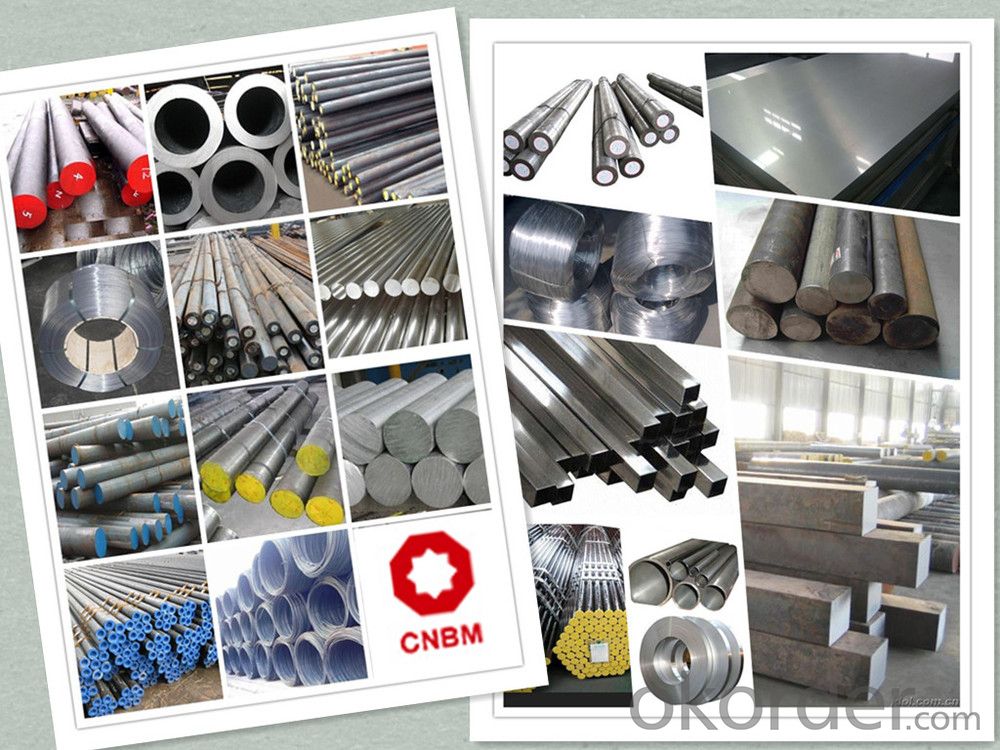
Product Overviews
| Product Name | Typical Grades | Diameter(mm) | Standard adopted |
| Carbon Steel | 20 (1020/S20C/C22) | Ø16-Ø300 |
GB/SAE/JIS/DIN
|
| 40 (1040/S40C/C40) | |||
| 45 (1045/S45C/C45) | |||
| Bearing Steel | GCr9 (51100/SUJ1) | Ø12-Ø250 | |
| GCr15 (52100/SUJ2/100Gr6) | |||
| GCr9SiMn (A485-Gr.1/SUJ3) | |||
Cr-Mo Steel | 20Cr (5120/SCr420H/20Cr4) | Ø12-Ø250 | |
| 40Cr (5140/SCr440/41Cr4) | |||
| 42CrMo(4140/SCM440/42CrMo4) | |||
| Gear Steel | 20CrNiMo | Ø16-Ø600 | |
| 20CrMn(5115/SMnC420/20MnCr5) | |||
| 20CrNiMo(8620/SNCM220/20CrMiMo2) |
Application
| Carbon Steel | Mold bottom, Plastic mold, Construction machinery parts Automobile parts, Security grills, Screens, Construction |
| Bearing Steel | Aerospace, Navigation, Nuclear energy, Chemical industry Electronic information, Petrochemical, Instrument and meter Transportation |
| Cr-Mo Steel | Mechanism & Fasteners gear, Stressed components for vehicles Engines and machines, Parts of larger cross-section |
| Gear Steel | All kinds of gears, Statically and dynamically stressed component for vehicles Engines and machine, Larger cross-section parts, Crankshafts |
Work Shop
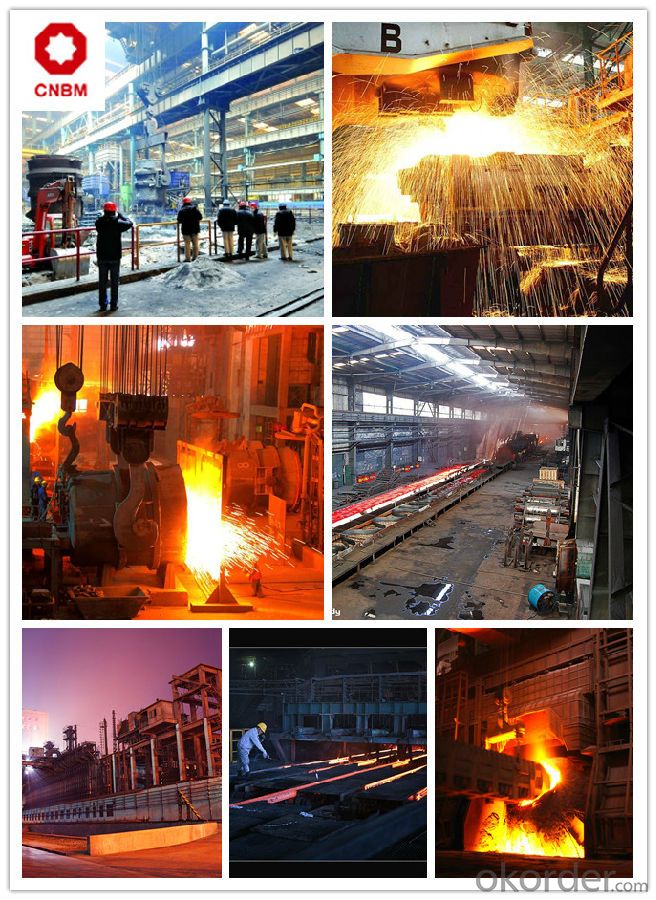
Company Information
CNBM International Corporation is the most important trading platform of CNBM group.
Whith its advantages, CNBM International are mainly concentrate on Cement, Glass, Iron and Steel, Ceramics industries and devotes herself for supplying high qulity series of refractories as well as technical consultancies and logistics solutions.

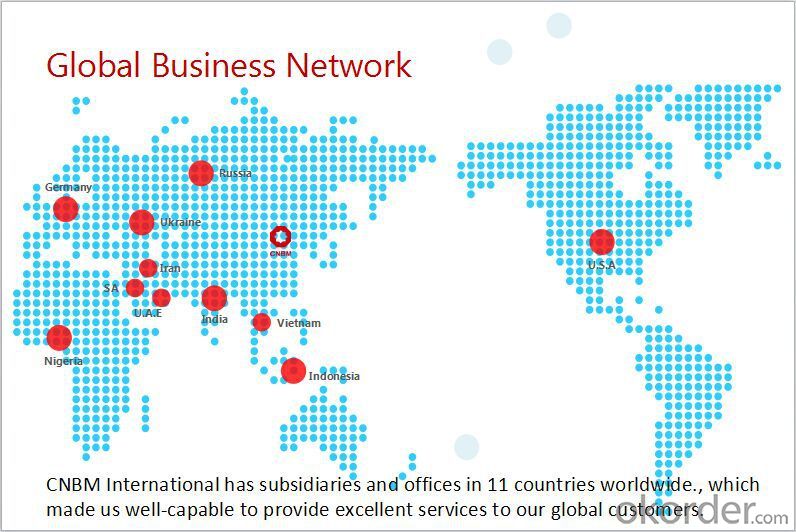
FAQ
1, Your advantages?
professional products inquiry, products knowledge train (for agents), smooth goods delivery, excellent customer solution proposale
2, Test & Certificate?
SGS test is available, customer inspection before shipping is welcome, third party inspection is no problem
3, Factory or Trading Company?
CNBM is a trading company but we have so many protocol factories and CNBM works as a trading department of these factories. Also CNBM is the holding company of many factories.
4, Payment Terms?
30% TT as deposit and 70% before delivery.
Irrevocable L/C at sight.
5, Trading Terms?
EXW, FOB, CIF, FFR, CNF
6, After-sale Service?
CNBM provides the services and support you need for every step of our cooperation. We're the business partner you can trust.
For any problem, please kindly contact us at any your convenient time.
We'll reply you in our first priority within 24 hours.
Packaging & Delivery
1, Packaging: seaworthy package or as required
2, Delivery: 35-45 days or based on quantity
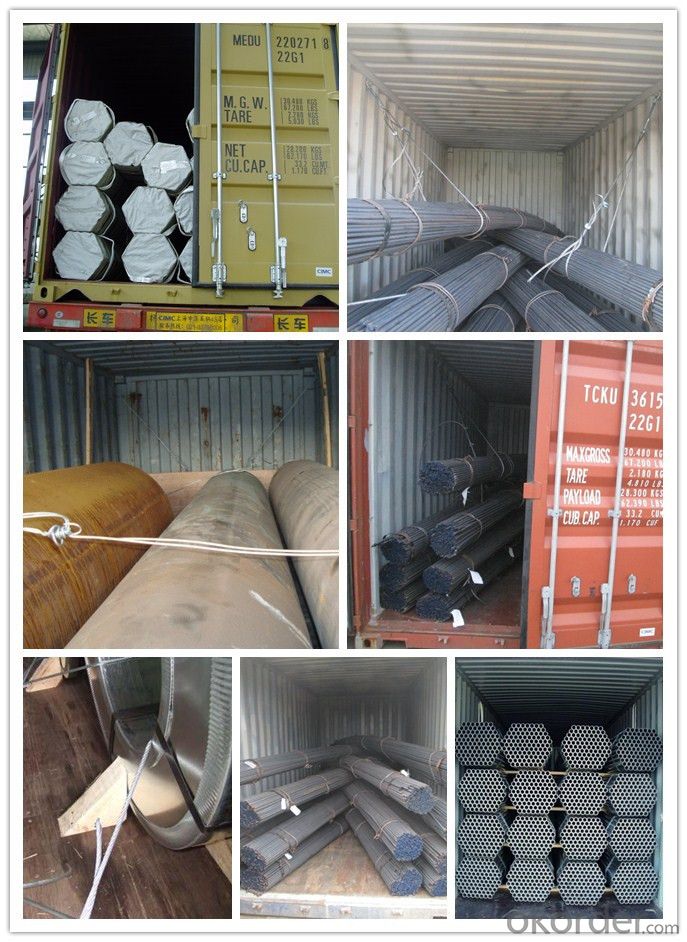
- Q: How do you measure the diameter of a steel round bar?
- To measure the diameter of a steel round bar, you can use a caliper or a micrometer. Simply place the measuring tool across the widest point of the bar and read the measurement displayed on the tool.
- Q: Are steel round bars suitable for the production of gears?
- Yes, steel round bars are suitable for the production of gears. Steel is a strong and durable material that can withstand high levels of stress and friction, making it ideal for gear manufacturing. Additionally, steel round bars can be easily machined and heat-treated to achieve the required hardness and precision for gear production.
- Q: Difference between round bar and other steel bars
- Round steel is a solid strip of steel whose cross section is round. The specifications are expressed in millimeters of diameter, such as "50", which means a round bar of 50 millimeters in diameter.
- Q: How do you identify the grade of a steel round bar?
- The grade of a steel round bar can be identified through several methods. One way is to check the markings or labels on the bar itself. Manufacturers often stamp or engrave the grade directly onto the surface of the bar. These markings typically include information such as the grade designation (e.g., 304, 316, 4140), which represents the specific alloy composition, and may also include additional details such as the heat or lot number. Another method is to refer to the mill test certificate (MTC) that accompanies the steel round bar. The MTC provides comprehensive information about the composition, mechanical properties, and other relevant specifications of the material. The MTC is usually issued by the steel mill or supplier and can be requested upon purchase. Moreover, visual inspection and physical testing can help identify the grade of a steel round bar. Visual inspection involves observing the bar's appearance, texture, and color. Different grades of steel may exhibit distinct characteristics, such as a shiny or matte finish, specific surface treatments, or variations in color due to different alloying elements. Physical testing methods, such as tensile or hardness testing, can provide further confirmation of the steel grade. These tests measure the mechanical properties of the material, such as its strength, ductility, and hardness. By comparing the test results with known standards and specifications for different steel grades, one can determine the grade of the round bar. In summary, to identify the grade of a steel round bar, one can check for markings on the bar, refer to the mill test certificate, visually inspect the bar, and perform physical tests to assess its mechanical properties.
- Q: What are the different types of tests performed on steel round bars for quality control?
- There are several types of tests performed on steel round bars for quality control. These include visual inspection, dimensional checks, surface roughness evaluation, hardness testing, tensile testing, impact testing, and chemical composition analysis. These tests help ensure that the steel round bars meet the required quality standards and are fit for their intended applications.
- Q: How do steel round bars compare to aluminum or steel tubing?
- Steel round bars, aluminum tubing, and steel tubing all have their own unique properties and applications, so it is important to understand the characteristics of each material before making a comparison. Steel round bars are solid cylindrical bars made of steel. They are known for their high strength and durability, making them suitable for heavy-duty applications. Steel round bars have excellent tensile strength and can withstand high levels of stress and pressure. They are often used in construction, manufacturing, and engineering projects where strength and structural integrity are crucial. Steel round bars are also highly resistant to corrosion, making them suitable for outdoor and marine applications. Aluminum tubing, on the other hand, is made from aluminum, which is a lightweight and corrosion-resistant material. Aluminum tubing is known for its excellent thermal conductivity and electrical conductivity. It is often used in applications where weight reduction is important, such as in the aerospace and automotive industries. Aluminum tubing is also commonly used in the construction of heat exchangers and in electrical wiring systems due to its conductivity properties. Steel tubing, similar to steel round bars, is made of steel but is hollow in shape. Steel tubing is known for its versatility and wide range of applications. It is available in various shapes and sizes, including round, square, and rectangular, allowing for different structural designs. Steel tubing is often used in construction, automotive manufacturing, and industrial applications. It offers high strength and rigidity, making it suitable for applications that require structural support or the ability to withstand heavy loads. In comparison, steel round bars offer superior strength and durability compared to aluminum and steel tubing. They are ideal for heavy-duty applications that require high levels of strength and structural integrity. However, steel round bars can be heavier and more expensive than aluminum tubing, which is often preferred for lightweight applications. Steel tubing, on the other hand, provides versatility in terms of shape and size, allowing for more design options. Ultimately, the choice between steel round bars, aluminum tubing, and steel tubing depends on the specific requirements of the application, including factors such as strength, weight, cost, and corrosion resistance. It is important to carefully evaluate these factors and consult with experts to determine the most suitable material for a particular project.
- Q: What are the advantages of using vanadium-alloy steel round bars?
- There are several advantages of using vanadium-alloy steel round bars. Firstly, vanadium-alloy steel has significantly increased strength and toughness compared to regular steel. This makes it an ideal choice for applications where high strength and durability are required, such as in construction, manufacturing, and engineering projects. The addition of vanadium enhances the steel's ability to withstand heavy loads, impacts, and extreme temperatures, making it suitable for demanding environments. Secondly, vanadium-alloy steel round bars have excellent resistance to corrosion. Vanadium forms a protective oxide layer on the surface of the steel, preventing the metal from rusting or corroding. This makes the bars highly durable and long-lasting, even in harsh or corrosive environments. Additionally, vanadium-alloy steel has good weldability and machinability. It can be easily welded, allowing for efficient fabrication and construction processes. The steel's machinability allows for precise shaping and forming, making it adaptable to various design requirements. Furthermore, vanadium-alloy steel exhibits excellent wear resistance. This is particularly beneficial in applications where the bars are subjected to high levels of friction, abrasion, or wear, such as in mining or manufacturing equipment. The addition of vanadium enhances the steel's hardness and wear resistance, prolonging the lifespan of the bars and reducing maintenance costs. Lastly, vanadium-alloy steel has excellent heat resistance. It can withstand high temperatures without losing its strength or structural integrity. This makes it suitable for applications that involve exposure to extreme heat, such as in automotive engines, turbines, or power generation equipment. In conclusion, the advantages of using vanadium-alloy steel round bars include increased strength and toughness, resistance to corrosion, good weldability and machinability, excellent wear resistance, and high heat resistance. These qualities make vanadium-alloy steel round bars a reliable and versatile choice for a wide range of applications.
- Q: How do steel round bars compare to wrought iron bars?
- Steel round bars and wrought iron bars have several differences that set them apart. Firstly, steel round bars are made from an alloy of iron and carbon, whereas wrought iron bars are composed of pure iron with a low carbon content. This difference in composition leads to varying properties. Steel round bars are known for their strength and durability, making them suitable for a wide range of applications, including construction, manufacturing, and engineering. On the other hand, wrought iron bars are softer and more malleable, allowing them to be easily shaped and formed into intricate designs. This characteristic makes wrought iron bars popular in decorative applications such as gates, fences, and ornamental pieces. Another difference lies in their manufacturing processes. Steel round bars are typically produced through hot rolling, which involves heating the steel billet and passing it through a series of rollers to shape it into the desired round bar form. In contrast, wrought iron bars are made through a labor-intensive process called blacksmithing. This involves heating the iron and repeatedly hammering it to remove impurities and create a fibrous structure, resulting in its characteristic grainy appearance. In terms of cost, steel round bars are generally more affordable compared to wrought iron bars. The manufacturing process for steel is more streamlined and efficient, leading to lower production costs. Wrought iron bars, on the other hand, require more time and labor, making them more expensive. Finally, when it comes to corrosion resistance, steel round bars have an advantage. Steel can be further alloyed with elements such as chromium, nickel, and molybdenum to enhance its resistance to rust and corrosion. This makes steel round bars suitable for outdoor applications where they may be exposed to moisture and harsh environmental conditions. Wrought iron bars, although they possess some level of corrosion resistance, are more prone to rusting and require regular maintenance to prevent deterioration. In conclusion, steel round bars and wrought iron bars differ in terms of composition, strength, manufacturing process, cost, and corrosion resistance. The choice between the two will depend on the specific requirements of the application, with steel round bars being favored for their strength and affordability, while wrought iron bars are often chosen for their malleability and decorative appeal.
- Q: What are the advantages of using titanium-alloy steel round bars?
- There are several advantages of using titanium-alloy steel round bars: 1. High strength: Titanium-alloy steel round bars have exceptional strength-to-weight ratio, making them ideal for applications where strength is crucial. Their high tensile strength allows them to withstand heavy loads and resist deformation. 2. Corrosion resistance: Titanium-alloy steel round bars exhibit excellent corrosion resistance, even in highly corrosive environments. This property makes them suitable for marine, aerospace, and chemical industries, where exposure to saltwater or chemicals is common. 3. Lightweight: Compared to other metal alloys, titanium-alloy steel round bars are relatively lightweight. This characteristic makes them advantageous in applications where weight reduction is important, such as in aerospace and automotive industries, as it allows for better fuel efficiency and increased payload capacity. 4. High temperature resistance: Titanium-alloy steel round bars can withstand high temperatures without losing their structural integrity. This property makes them suitable for applications in high-temperature environments, such as in power generation and oil and gas industries. 5. Biocompatibility: Titanium is a biocompatible material, meaning it is well-tolerated by the human body and does not cause adverse reactions. This makes titanium-alloy steel round bars suitable for medical implants, such as orthopedic implants and dental fixtures, where biocompatibility is critical. 6. Excellent fatigue resistance: Titanium-alloy steel round bars have exceptional fatigue resistance, which means they can withstand repeated loading and unloading without experiencing fatigue failure. This property makes them suitable for applications that require long-term durability and reliability, such as in structural components and machinery. Overall, the advantages of using titanium-alloy steel round bars lie in their high strength, corrosion resistance, lightweight nature, high temperature resistance, biocompatibility, and excellent fatigue resistance. These properties make them a versatile choice for various industries, ranging from aerospace and automotive to medical and petrochemical sectors.
- Q: What is the maximum molybdenum content allowed for steel round bars?
- The allowed molybdenum content in steel round bars varies based on the grade and specific steel requirements. Generally, standard carbon and alloy steels have a maximum molybdenum content of around 0.25-0.30%. However, high-performance steels like tool steels or stainless steels can have a higher maximum molybdenum content, ranging from 1-10%, depending on the grade and application. To determine the precise maximum molybdenum content allowed for a specific steel round bar, it is essential to refer to industry standards, specifications, or material data sheets.
Send your message to us
Hot Rolled A36 Carbon Steel Round Bars
- Loading Port:
- China main port
- Payment Terms:
- TT OR LC
- Min Order Qty:
- 30 m.t.
- Supply Capability:
- 10000 m.t./month
OKorder Service Pledge
OKorder Financial Service
Similar products
Hot products
Hot Searches
Related keywords
